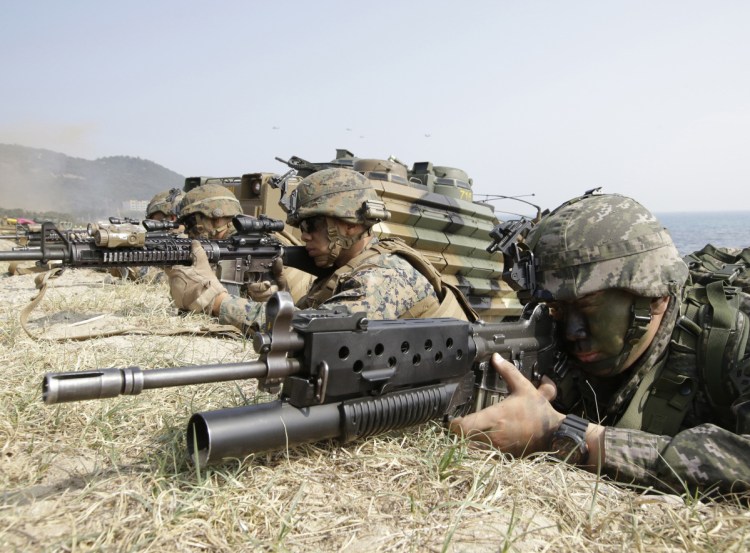WASHINGTON — President Trump announced a halt to joint military exercises with South Korea on Tuesday, raising alarm at the Pentagon, in Congress and among allies that the U.S. might back away from longstanding defense commitments in the region without concrete concessions from long-belligerent North Korea.
Trump unveiled the move at a news conference with North Korean leader Kim Jong Un after their summit in Singapore. He said he also wants to eventually withdraw the 28,500 U.S. troops permanently stationed in the South as a deterrent against North Korea, which until just months ago was threatening Seoul and Washington with nuclear war.
Administration officials said halting the joint exercises is a relatively modest concession that has great symbolic importance to Pyongyang. By helping to build trust between two longtime adversaries, the officials argued, the U.S. action could make it more likely that Kim will move forward on talks aimed at eliminating his nuclear arsenal.
But Trump’s seemingly off-hand remarks, without warning to allies South Korea and Japan, marked a potentially sharp shift in U.S. defense posture in East Asia and contradicted decades of statements by American officials that the exercises are defensive only and critical for deterring North Korea.
Further unsettling foreign allies and even Republicans in Congress, the president echoed North Korea’s own pejorative phrases in announcing suspension of the joint exercises with South Korea. Trump said he had agreed to stop the “war games” because they are “very provocative,” terms used by North Korea in denouncing the drills, adding that it would save the United States “a tremendous amount of money.” He said the exercises would be suspended “unless and until we see the future negotiation” on eliminating Pyongyang’s nuclear arsenal “is not going along like it should.”
The decision was quickly portrayed by critics as a one-sided giveaway to a country that maintains one of the largest standing military forces in the world.
“These exercises for years have served as an important signal that the United States supports our allies in the region,” Sen. Dianne Feinstein, D-Calif., said in a statement. “It concerns me that the president is making concessions to North Korea with nothing to show in return.”
Sen. David Perdue of Georgia, a Republican member of the Senate Armed Services Committee, told reporters he was “very troubled” and “surprised.”
The annual exercises, which include warplanes and naval maneuvers, have been held since at least 1976 to help the allied forces prepare for a possible North Korea attack.
In response to Republican senators’ worries, Vice President Mike Pence reassured them that smaller, routine training exercises will continue, according to Sen. Cory Gardner, R-Colo.
Pentagon officials have long believed that the much larger, yearly exercises deter North Korea and improve the readiness of U.S and South Korean troops. Former military commanders who worked in South Korea say the drills are essential in a foreign theater where rank-and-file service members, their officers and the civilian analysts who support them turn over annually. This year, four separate exercises were conducted from early April to late May. One, called Foal Eagle, involved 11,500 U.S. and 290,000 South Korean troops. It was followed by Key Resolve, which used computer simulation of a possible attack by North Korea to improve headquarters command and control.
Those were followed by Warrior Strike and Max Thunder, the latter an Air Force exercise that originally included sending U.S. bombers from Guam to South Korean airspace. Commanders abandoned that scenario to avoid angering Pyongyang ahead of the summit.
Suspending all such drills without parallel concessions from Pyongyang could make reaching a larger deal on restricting North Korea’s nuclear arsenal even tougher, said Michael Green, senior vice president for Asia at the Center for Strategic and International Studies.
It takes away leverage from Secretary of State Mike Pompeo, who is expected to lead continuing talks with North Korea, Green said, and “is heartwarming for Moscow and Beijing.” Russia and China have long joined North Korea in denouncing the U.S. maneuvers in South Korea as a rehearsal for invasion.
The move could also impose a de facto timeline for making progress in the forthcoming nuclear talks because, with another round of military exercises scheduled for late August, Pompeo may want to see concrete actions out of Pyongyang by then, said Victor Cha, formerly a national security adviser to the George W. Bush administration.
Trump’s announcement apparently caught U.S. military commanders and officials in South Korea and Japan by surprise. Both countries have longstanding defense treaties with the United States.
“There is concern for both allies,” Cha said, “that Trump does not really value alliances and commitments. They are seeing their issues become bargaining chips” with Kim.
The U.S. military command in South Korea has “received no official updated guidance on execution or cessation on any upcoming training exercises,” said Army Col. Chad Carroll, a spokesman for the command. “We will continue with our current military posture until we receive updated guidance.”
Defense Secretary James. N. Mattis, however, was “not surprised” by the decision to cancel the drills, said spokeswoman Dana White. “They had spoken on all of these issues well in advance.”
Green, the Asia scholar at CSIS, said it was “astonishing” and “unprecedented” for an American president to tell an adversary like Kim of his military plans before informing affected allies.
Send questions/comments to the editors.



Success. Please wait for the page to reload. If the page does not reload within 5 seconds, please refresh the page.
Enter your email and password to access comments.
Hi, to comment on stories you must . This profile is in addition to your subscription and website login.
Already have a commenting profile? .
Invalid username/password.
Please check your email to confirm and complete your registration.
Only subscribers are eligible to post comments. Please subscribe or login first for digital access. Here’s why.
Use the form below to reset your password. When you've submitted your account email, we will send an email with a reset code.